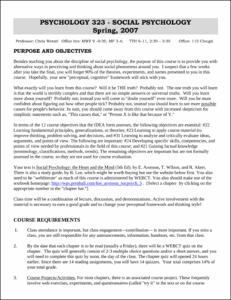Please use this identifier to cite or link to this item:
http://hdl.handle.net/10267/3646| Title: | PSYC 323-01, Social Psychology, Spring 2007 |
| Authors: | Wetzel, Chris |
| Keywords: | Psychology, Department of;Syllabus;Text;Curriculum;2007 Spring |
| Issue Date: | 11-Jan-2007 |
| Publisher: | Memphis, Tenn. : Rhodes College |
| Series/Report no.: | Syllabi CRN |
| Abstract: | Besides teaching you about the discipline of social psychology, the purpose of this course is to provide you with alternative ways in perceiving and thinking about social phenomena around you. I suspect that a few weeks after you take the final, you will forget 90% of the theories, experiments, and names presented to you in this course. Hopefully, your new "perceptual, cognitive" framework will stick with you. What exactly will you learn from this course? Will it be THE truth? Probably not. The one truth you will learn is that the world is terribly complex and that there are no simple answers or universal truths. Will you learn more about yourself? Probably not; instead you will come to "doubt yourself" even more. Will you be more confident about figuring out how other people tick? Probably not, instead you should learn to see more possible causes for people's behavior. In sum, you should come away from this course with increased skepticism for simplistic statements such as, "This causes that," or "Person X is like that because of Y." In terms of the 12 course objectives that the IDEA form assesses, the following objectives are essential: #22 Learning fundamental principles, generalizations, or theories; #23 Learning to apply course material (to improve thinking, problem solving, and decisions, and #31 Learning to analyze and critically evaluate ideas, arguments, and points of view. The following are important: #24 Developing specific skills, competencies, and points of view needed by professionals in the field of this course; and #21 Gaining factual knowledge (terminology, classifications, methods, trends). The remaining objectives are important but are not formally assessed in the course, so they are not used for course evaluation. Your text is Social Psychology: the Heart and the Mind (5th Ed). by E. Aronson, T. Wilson, and R. Akert. There is also a study guide, by B. Lee, which might be worth buying but see the website below first. You also need to be "webliterate" as much of this course is administered by WEBCT. You also should make use of the textbook homepage: http://wps.prenhall.com/hss_aronson_socpsych_5 . [Select a chapter by clicking on the appropriate number in the "chapter bar."] Class time will be a combination of lecture, discussion, and demonstrations. Active involvement with the material is necessary to earn a good grade and to change your perceptual framework and thinking style! |
| Description: | This syllabus was submitted to the Office of Academic Affairs by the course instructor. |
| URI: | http://hdl.handle.net/10267/3646 |
| Appears in Collections: | Course Syllabi |
Files in This Item:
| File | Description | Size | Format | |
|---|---|---|---|---|
| 2007_sp_PSYC_323-01.pdf | 98.76 kB | Adobe PDF |  View/Open |
Items in DSpace are protected by copyright, with all rights reserved, unless otherwise indicated.